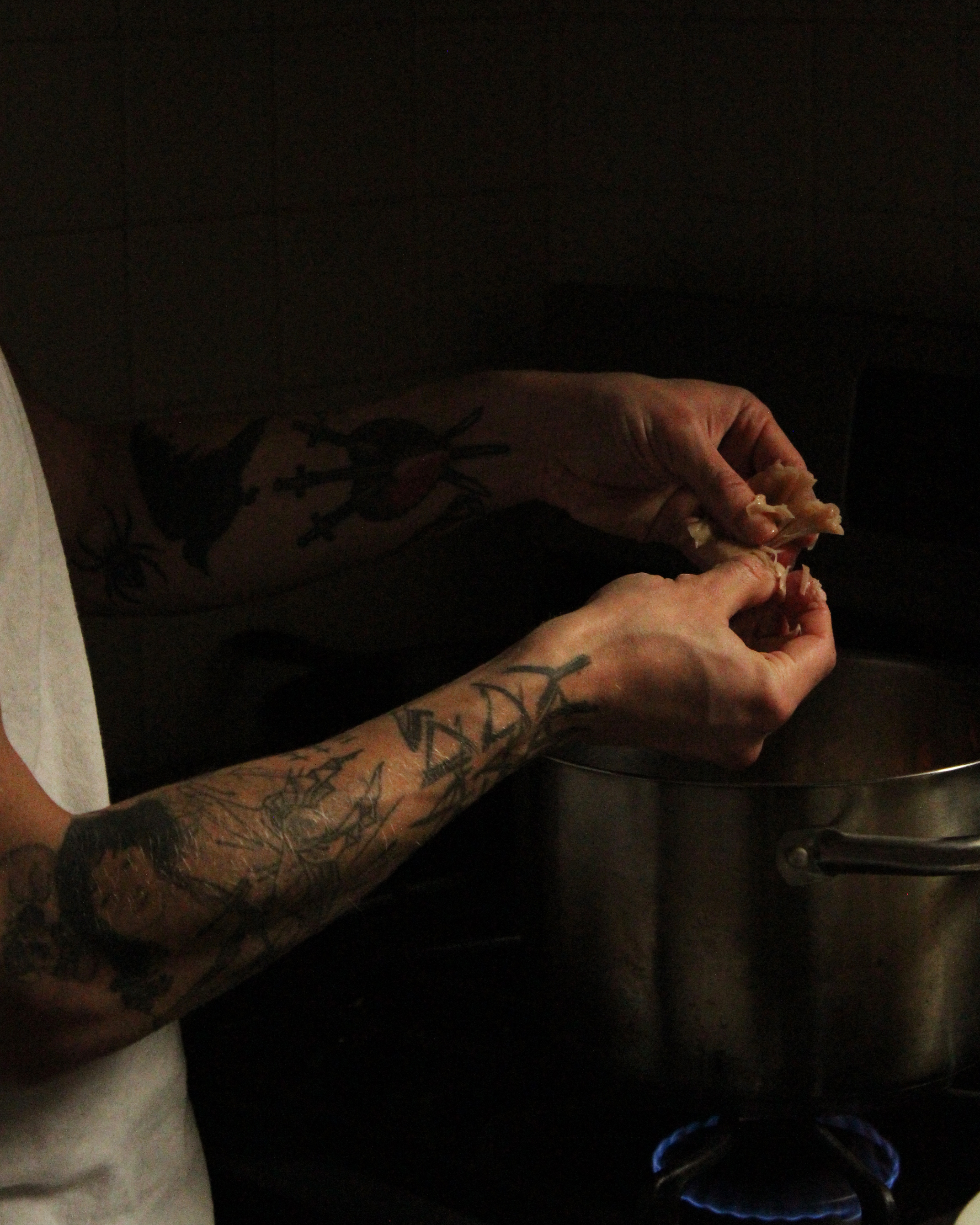"Chicken" & Dumplings

Southern Food
I powdered my wooden cutting board with a scattering of flour and moved the fine grains around in a circular motion, as if I was applying lotion to the skin. I moved the gluten ball of kneaded flour to a bowl that was neighbored by chopped celery and chunky carrots. Earlier that day, I had called my mother to get a recipe because I was craving some southern food, salivating over “Chicken” and Dumplings.
I cut a thick slab of butter and recalled the phone calls my mother use to make. “The key is a lot of butter.” My great grandmother would say with a shaky voice. “Thank you maw maw.” My mother would respond, shortly after her dose of family gossip. “Love you.”
Never afraid of fats, there is nothing conservative about southern food - mac & cheese, mashed potatoes, collard greens, cornbread, and pork fat in the green beans. And nor were our family gatherings shy of identity. Southern cuisine is one that is eaten with pride and anytime I made Thanksgiving dinner, New Years black eyed peas & collards, or revisited a family recipe, I bragged about my ability to make it - the fine dime of American cuisine.
When my mother text me the recipe she had on hand, it was from Southern Living’s Homestyle Cooking. It was a great foundation for my understanding of this dish, but not great for my understanding of Southern food. Growing up mixed, when I went home to the south, I knew of two types of food. My mom’s family - turkey, mashed potatoes, mac & cheese, and green beans. And my dad’s - fried chicken, okra, potato salad, and collards. Both sides of the family having fusions of each other. All dishes showed up at both tables, and when I was lucky, all of the family, including my stepdad and stepmom, would show up too. When I was little, I never thought of the two having separate stories, green beans vs collard greens or fried chicken vs turkey, for they were both a part of me. I didn’t think about the way my Aunt Mookie cooked and how it was different to the way my mother cooked. In my eyes, they were all love. And to this day, they still represent love, but as I cooked my chicken and dumplings, I couldn’t help but to think of the history of that meal, of this cuisine, of soul food.
“Why aren’t my forefathers, the creators, the black innovators, the beginners of American black excellence visible for the labor and torture they endured to truly birth an American cuisine?”
The story of Southern food is tragic. It was created on the backs of slaves. Their African influences on British and French food is what is now housed on the many tables of the bible belt. Creating a roux that is heavy in greens and Okra and adding spices is what we now know as Gumbo. Their hands provided seeds to diversify our landscapes, much like our food culture. Okra, watermelon, millet, and pigeon peas were graced upon us because of the exploitation of slaves. These culinary experts were not respected. They were abused, often stuck with the scraps like pot likker - the trash stew of greens. And still to this day, when you Google southern chefs, all of the faces are white. Southern food was taught to white folk, and I being of both races am asking myself, “why aren’t my forefathers, the creators, the black innovators, the beginners of American black excellence visible for the labor and torture they endured to truly birth an American cuisine?”
To understand systematic oppression is to understand history. So when people say to me, “racial tension is getting better.” I want to ask them, “do you know who Edna Lewis is? Or James Heming? Do you know the story of redlining and it’s ripple effect through the struggle of black business owners?” Until our story is being told with passion and vigor and not swept under the rug, then racial inequalities are not better. If you don’t know of the black cooks who gardened our culinary history, read about them and then talk about them and continue talking about them until they are written about with great importance in our history books, until they have monuments throughout our country, and until black figures tower over confederate figures.
Chicken & Dumplings
- 1 1/2 c gluten free flour
- 4 tbs butter (1 TBS for the pot)
- 7 tbs cold water
- 1 flax egg
- Salt & pepper to taste
- 1/4 tsp dried tarragon
- 1 bay leaf
- 5 c veggie broth
- 1 tsp paprika
- 3 stocks celery
- 2 chopped carrots
- 2 c shredded jackfruit
- In a bowl, combine flour, 3 tbs butter, and a sprinkle of salt (feel free to add onion powder as well)
- Once crumbly, add in water and flax egg, stir until mixed well and then knead about 4 or 5 times
- Set aside
- In a medium size pot, over medium high heat, melt 1 tbs butter
- Add chopped celery and carrots
- Cook for about five
- Add shredded jackfruit and sprinkle in tarragon, paprika, and a generous amount of salt and pepper - allow a few minutes to cook
- Pour in vegetable broth and bring to a boil
- As the broth heats up, roll your dough out and cut into 2 in x 1 in pieces ( I just tear them into a descent size)
- Add into boiling broth
- Boil for two minutes and turn the heat to low
- Allow to simmer for about 15 minutes, until the soup thickens up from the flour
- Once creamy, serve
- Enjoy




